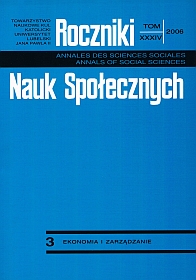The German Conception of Social Market Economy (pol. SGR) and its Implications in Polish Economical Theory and Practice
Abstract
The concept of Social Market Economy (z pol. SGR-Społeczna Gospodarka Rynkowa) originated in Germany. Its predecessor, as it is widely recognized, was the German version of liberalism, also known as ordoliberalism (Ordo-Liberalismus), the main theoretician of which was Alfred Müller-Armack, whereas the man who put it into practice was Ludwig Erhardt.
The original SGR assumptions which emerged when the Christian Democrats where in power in former West Germany are recognized as the first stage of this concept. The second stage followed when the Social Democrats from SPD won the election. They also accepted the concept and in 1959 they recognized it as their own. The main theoretician of the Social Democrats government economic principles was professor Karl Schiller. From that time on it has been said in West Germany that when the Christian Democrats parties are in power they tend to put pressure on SGR market aspect, whereas the government and Social Democrats parties stress its social aspect. Some of the SGR assumptions have been adopted by Social Democrats of Western Europe as well.
In Poland the decision to adopt the assumptions of SGR was made and placed in The New Constitution (April 1997). The number 20 article of The Constitution says the country approves of the idea of grounding the economic system in Poland on SGR assumptions, and even more precisely-on its liberal version.
The academic output of Polish economists dealing with SGR principles and their “adaptability” in Polish socio-economic reality is quite impressive. Among many representatives of Polish scientific thought engaged in SGR research, professor Tadeusz Przeciszewski is quite an outstanding person. He created his own, so called Polish version of this concept, defining it with the SER-GR (z pol. Społecznej Ekologicznej i Regulowanej Gospodarki Rynkowej) abbreviation, which stands for: Social Ecological and Controlled Market Economy. SER-GR is a kind of formula, which is something intermediate between Christian Democrats liberal version and Social Democrats intervention-institutional one, like the one in West Germany. Tadeusz Przeciszewski puts a lot of stress on creating, on the basis of the Polish version of SGR, some kind of a programme to fight unemployment. In his opinion it is desirable to reduce the leading role of technological progress and its development possibilities dealing with the areas of national output and services, so as to give way to ecology.
Comparing Polish experiences in introducing SGR into socio-economic policy during the last few years with a German model of SGR one can notice a couple of differences. According to the author of this article ,the SGR we can see in contemporary Poland is only a substitute of that German one. It is but a slogan written down in law. In West Germany the unemployment rate is pretty high as well, which is a sign of SGR crisis in that country.
The cause to SGR failure in West Germany is, according to the author, withdrawing from its original assumptions. Particularly it concerns the overdeveloped social welfare system factor, as well as social insurance and backing up economy monopolistic tendencies. Due to this the author states a question: what socio-economic model is the best future model for Poland?
In the author’s opinion SGR model can be a save option for Polish economy when the country joins the European Union. The problem is to contribute to that final model only with our own character and those features of EU model which allow our economy to obtain a steady, strong status when trying to get a competitive supremacy on a global scale, and make it possible to achieve a long term economic progress.
References
Błahut K., Socjalna gospodarka rynkowa, „Ekonomista” 3(1989), s. 496.
Dahrendorf R., Tony Blair and Gerhard Schröder: Europe the Third Way-Die neue Mitte. Cyt. za: K. Jendroszczy, „Rzeczpospolita” z 5.07.1997.
Grimm K., Socjalna gospodarka rynkowa. Jak to robią Niemcy? red. W. Sartorius, Wyd. Fundacja F. Eberta, Warszawa 1992.
Kaczmarek T., Cud gospodarczy Niemiec. Ludwiga Erharda koncepcja społecznej gospodarki rynkowej, Wyd. Fundacja ATK, Warszawa 1997.
Konstytucja RP, wyd. z 1998 r.
Kozłowski S. G., Społeczna gospodarka rynkowa. Niemiecki model a polska rzeczywistość, w: Społeczna gospodarka rynkowa w Polsce. Model a rzeczywistość, red. S. Partycki, Wyd. UMCS, Lublin 2000.
Müller-Armack A., Wirtschaftlienkung und Marktwirtschaft (1947); wyd.II, Verlag für Wirtschaft und Sozialpolitik, Hamburg 1948.
Müller-Armack A., Wirstchaftsordnung und Wirtschaftpolitik. Studien und Konzepte zur Sozialen Marktwirtschaft und zur Europäischen Integration, Freiburg i. Br., Rombach 1966.
Przeciszewski T., Społeczna gospodarka rynkowa. Podstawy teoretyczne oraz próba konkretyzacji koncepcji w aktualnych warunkach polskich, w: Materiały pokonferencyjne Akademii Ekonomicznej w Katowicach, Katowice 1991.
Przeciszewski T., Społeczna gospodarka rynkowa: równowaga pomiędzy procesami komercjalizacji i prywatyzacji sektora publicznego, w: Studia i Materiały Instytutu Ekonomii UMCS, t. II, Lublin 1992.
Przeciszewski T., Społeczna Gospodarka Rynkowa (SGR). Propozycje w zakresie rozwiązań systemowo-organizacyjnych, składających się na jej specyfikę jako tzw. Trzeciej Drogi, w: Społeczna gospodarka rynkowa w Polsce. Model a rzeczywistość, red. S. Partycki, Wyd. UMCS, Lublin 2000.
Przeciszewski T., Referat na VII Kongresie Ekonomistów Polskich pt. „Koncepcja Społecznej Gospodarki Rynkowej (SGR): systemowa podstawa polityki gospodarczej i społecznej”, w: Materiały pokongresowe, Wyd. PTE, Warszawa 2001, z. 5.
Swadźba S., Czy społeczna gospodarka rynkowa może być docelowym modelem polskiej gospodarki?, w: Społeczna gospodarka rynkowa w Polsce. Model a rzeczywistość, red. S. Partycki, Wyd. UMCS, Lublin 2000.
Copyright (c) 2006 Roczniki Nauk Społecznych

This work is licensed under a Creative Commons Attribution-NonCommercial-NoDerivatives 4.0 International License.


